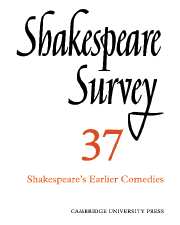Book contents
- Frontmatter
- Criticism of the Comedies up to The Merchant of Venice: 1953–82
- Plotting the Early Comedies: The Comedy of Errors, Love’s Labour’s Lost, The Two Gentlemen of Verona
- The Good Marriage of Katherine and Petruchio
- Shrewd and Kindly Farce
- Illustrations to A Midsummer Night’s Dream before 1920
- The Nature of Portia’s Victory: Turning to Men in The Merchant of Venice
- Nature’s Originals: Value in Shakespearian Pastoral
- 'Contrarieties agree': An Aspect of Dramatic Technique in Henry VI
- Falstaff’s Broken Voice
- ‘He who the sword of heaven will bear’: The Duke versus Angelo in Measure for Measure
- War and Sex in All’s Well That Ends Well
- Changing Places in Othello
- Prospero’s Lime Tree and the Pursuit of Vanitas
- Shakespearian Character Study to 1800
- How German is Shakespeare in Germany? Recent Trends in Criticism and Performance in West Germany
- Shakespeare Performances in Stratford upon–Avon–and London, 1982–3
- The Year's Contributions to Shakespearian Study 1 Critical Studies
- 2 Shakespeare’s Life, Times and Stage
- 3 Editions and Textual Studies
- Index
Shakespeare Performances in Stratford upon–Avon–and London, 1982–3
Published online by Cambridge University Press: 28 March 2007
- Frontmatter
- Criticism of the Comedies up to The Merchant of Venice: 1953–82
- Plotting the Early Comedies: The Comedy of Errors, Love’s Labour’s Lost, The Two Gentlemen of Verona
- The Good Marriage of Katherine and Petruchio
- Shrewd and Kindly Farce
- Illustrations to A Midsummer Night’s Dream before 1920
- The Nature of Portia’s Victory: Turning to Men in The Merchant of Venice
- Nature’s Originals: Value in Shakespearian Pastoral
- 'Contrarieties agree': An Aspect of Dramatic Technique in Henry VI
- Falstaff’s Broken Voice
- ‘He who the sword of heaven will bear’: The Duke versus Angelo in Measure for Measure
- War and Sex in All’s Well That Ends Well
- Changing Places in Othello
- Prospero’s Lime Tree and the Pursuit of Vanitas
- Shakespearian Character Study to 1800
- How German is Shakespeare in Germany? Recent Trends in Criticism and Performance in West Germany
- Shakespeare Performances in Stratford upon–Avon–and London, 1982–3
- The Year's Contributions to Shakespearian Study 1 Critical Studies
- 2 Shakespeare’s Life, Times and Stage
- 3 Editions and Textual Studies
- Index
Summary
It would be hard to imagine a more perfect illustration of our current uncertainty about the interpretation of Shakespeare’s comedies than the productions of these plays presented at Stratford in the Royal Shakespeare Company’s 1982-3 season. Barry Kyle’s interpretation of The Taming of the Shrew opened in October 1982. John Caird’s Twelfth Night and Adrian Noble’s The Comedy of Errors followed in the April and August of 1983. If you rearrange the first and second of these productions you are left, not merely with a sketch map of contemporary disagreement, but with a sequential history of recent critical thought.
Twelfth Night was a thoughtful, often moving, production which could in principle have been offered in this theatre at any time in the last fifty years. On an exquisite picture stage, actors in Jacobean costume offered a coherently thematic reading of the play. The assumption upon which such performance relies is the widely held belief that Shakespeare’s comedies are serious poetic statements designed, in H. B. Charlton’s words, ‘to elucidate the moral art of securing happiness’. The director’s duty is to elicit such meaning from the text and, on this occasion, ‘A great while ago the world began’ and ‘Youth’s a stuff will not endure’ were taken as the keynotes of a strikingly melancholic interpretation.
- Type
- Chapter
- Information
- Shakespeare Survey , pp. 163 - 174Publisher: Cambridge University PressPrint publication year: 1984

